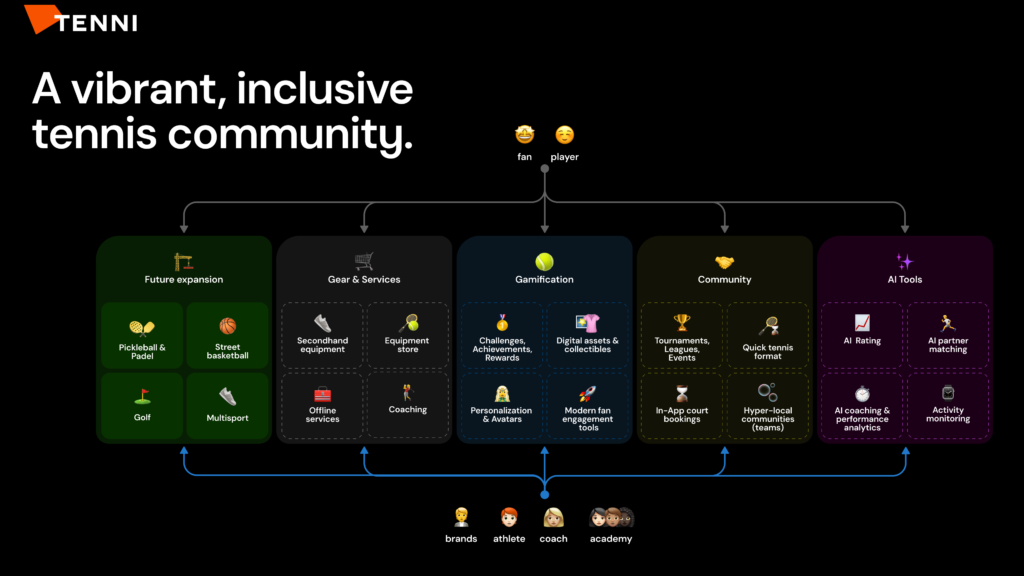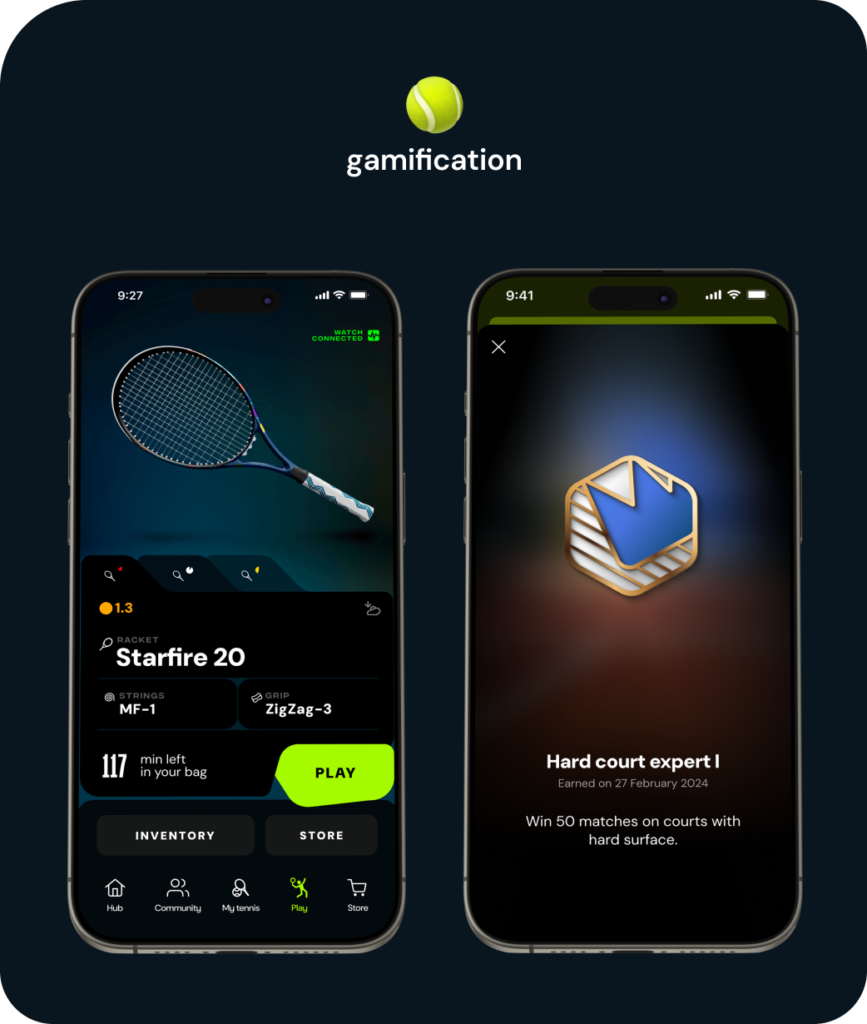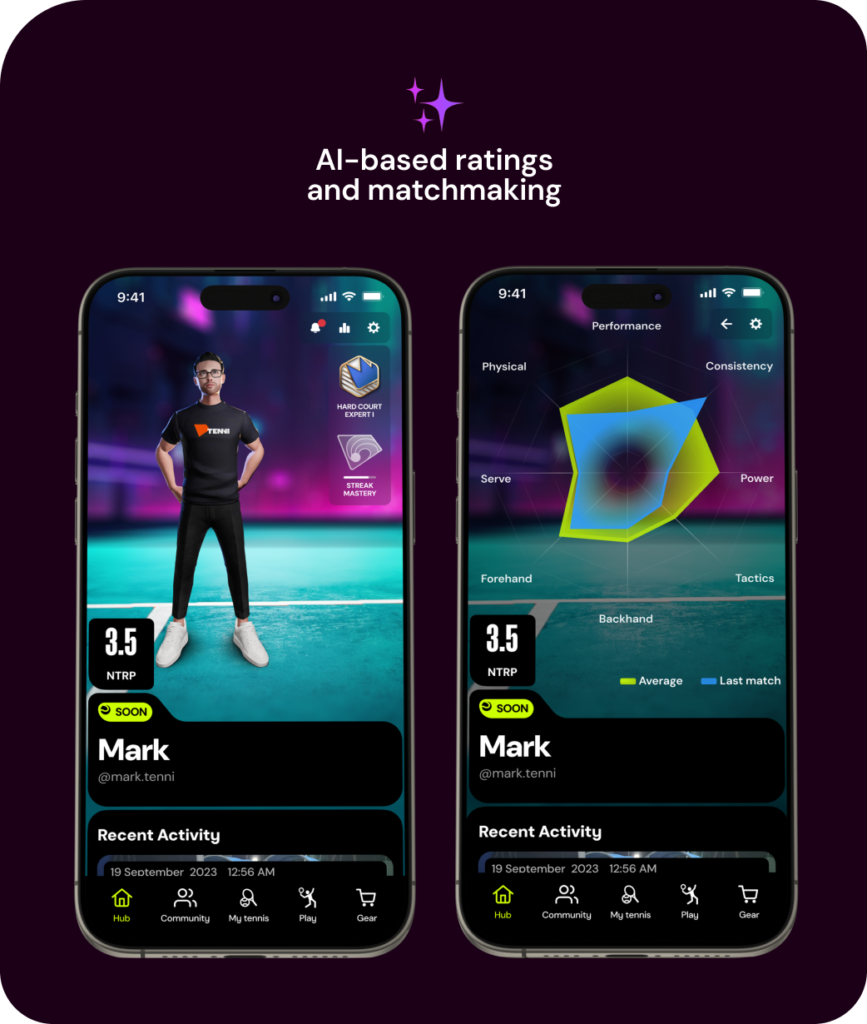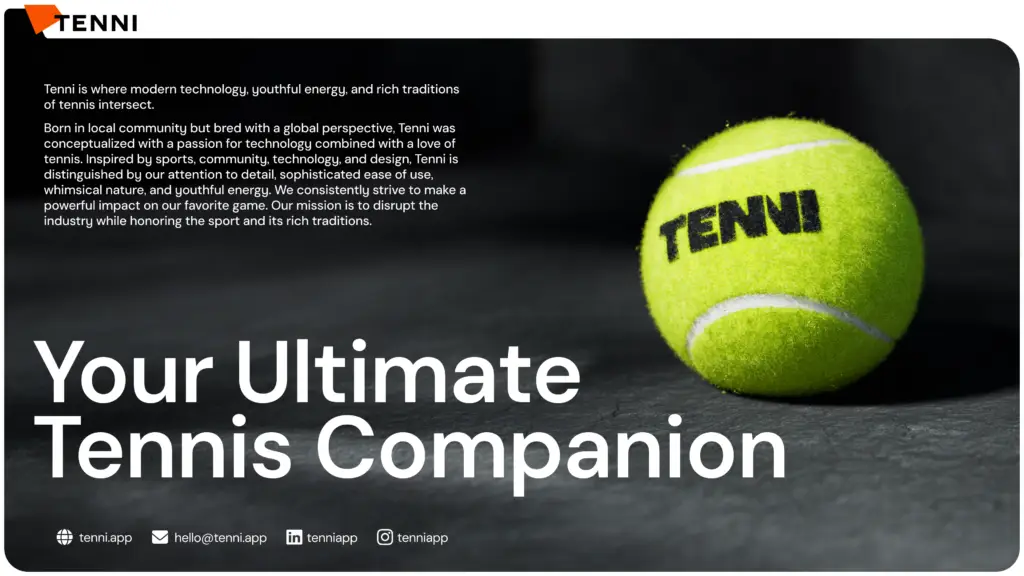Sports is all about community.
But how can you build community within a solo sport?
That’s what Tenni aims to solve within tennis.
Founder Mark Pesahovich struggled to find quality tennis partners after relocating several times.
After realizing how many other people had the same problem, he started to build a solution.
Tenni is now the only tennis companion app designed with a diverse community truly at the core.
They’ve been building in stealth for months and now they’re ready to bring it to tennis players across the world.
In this interview we discuss some of the struggles of launching a product, why community is important when building a company, and when you should bootstrap versus raising capital.
Hello, who are you and what is the name of your company?
Mark Pesahovich: I’m Mark Pesahovich. I have worked in the tech industry for over 25 years from engineering, all the way to leading companies as CEO.
Over the years I was involved in various projects, in different industries and companies, and had the chance to develop and deliver great products to people.
I started Tenni about two years ago.
After my last position, I took a few months off to relax and rest and unexpectedly found myself building a startup.
I’ve played tennis since I was a student. The vast majority of people mostly play with one or two play partners, and finding new ones is an issue.
I have relocated 3 times during the past 5 years, and each time I had to suspend my tennis activities due to struggles finding local tennis infrastructure, like courts and play partners.
After my last relocation, I was so annoyed by this issue that I started researching and diving deeper into the sports tech world.
Speaking to people playing tennis and other similar sports, revealed a widespread common frustration among players around the globe.
This ignited an idea of a dedicated platform that could streamline and modernize the tennis experience, much like Strava does for runners.
What was the process of getting the company off the ground?
Mark Pesahovich: Starting a company from scratch is hard. There are a lot of areas where you have to rely on your gut feeling.
I’ve started with three main things to create a path for the company:
- Finding a great co-founder, which I believe is THE major thing for any company
- More in-depth research. It’s crucial to have as much data as possible, as early as possible
- Developing product concept and prototype
For the co-founder part, I started to speak with my friends and former colleagues who I believe could be a good match and could be interested in this endeavor.
It wasn’t an easy process, people are not usually sitting and waiting for you to start a company.
They have their own plans, good jobs, ventures, and families.
Let’s not forget – starting a company is a huge risk.
And while many expressed an interest and saw the potential, it was either not the exact fit, or just not the right timing.
In any case, even the people who did not join me, brought value in their thoughts, ideas, and feedback, making the process valuable.
After some time running mostly alone, I unexpectedly met Oleg.
A friend and a former colleague made an intro, suggesting Oleg as a great design lead, along with many other qualities.
After a period of working together, we discussed the co-founder role, which I believe has worked great ever since.
In parallel, I’ve continued to research the market.
I’ve been speaking with potential customers, performing surveys, and getting feedback.
I’ve also been researching competitors and finding the right product-market fit as well as extending my network, and meeting people.
The latter proved itself a hugely efficient tactic.
I’ve found great advisors and built an advisory board, got a lot of highly valuable feedback, and built bonds and partnerships.
The third effort was the product.
Building a concept and developing it is simple. But executing it without the team and funds makes it much harder.
It is important to understand and accept that there is no chance you can build a final product in one take.
Great products are built iteratively. Pivots are inevitable and even good.
Knowing and anticipating these facts helped me a big deal.
I developed an initial concept and picked a few features to develop as a POC.
I then gathered a small team, allocating a tiny budget, and we built the very first version of the app.
Obviously, it wasn’t as easy as these few lines. We’ve already had to pivot at this stage when the market started to crash.
This version was distributed as a private alpha version to a small focus group we gathered within the local tennis community.
The feedback was very positive, even with that humble version, and motivated us to continue and build the full MVP to be released to the public.
As we’ve progressed, a growing understanding of the real market situation, pain, and needs, along with market and competitive analysis, focus group feedback, and a multitude of meetings with people from different backgrounds, agendas, and perspectives, strengthened our belief in a desperate need for our product and helped us shape our unique product vision.

How is the company doing today and what does the future look like?
Mark Pesahovich: Today, we are only a few months into releasing the product.
A vast majority of our current efforts are on marketing, boosting product awareness, driving user acquisition, and getting traction.
The numbers are still very early, but encouraging.
- 7.8 DAU (Daily Active Users)
- 23% CTR (Click Trough Rate) on trial Ad Campaign
- $3.2 CAC (Custome Acquisition Cost)
- 1.35K Product Page Views
- 18.58% Average Daily Conversion Rate
These numbers reflect the growing interest and engagement in Tenni, and we’re eager to build on this momentum.
We’ve worked hard to boost our social media presence as our main channel to bring users on board.
It’s not an easy task but being consistent is one of the keys to success.
The growth is there and we are optimistic about getting the momentum.
We continue developing Tenni, adding important features and value to our users.
As a community-driven platform, we rely on the community and its real needs in shaping our app and its future.
Business-wise, we’ve closed an important partnership with the largest retailer in the space, and a few more partnerships with selected young emerging brands.
In addition to developing the app and the marketing efforts, we’re working on developing the tennis community itself in the real world.
There is a multitude of existing local micro-communities that are already there. The vast majority of them operate in WhatsApp or Facebook groups, or similar.
Tenni wants to be the hub to unite all of these existing communities globally, creating a single tennis, pickleball, and padel community, that will not only be global but also diverse, inclusive, and safe for everyone.
So we are currently working on launching a meetup program that will include different activities in the real world, in a safe and comfortable environment.
The program will launch in a few major cities first and then spread globally. It will involve local influencers and community leaders, as well as our partners and even tennis stars.
The target audience for these meetups is anyone interested in playing one of our sports – casual players, fans, student-athletes, and others.
The idea of this was born out of an understanding that while people do want to find new play partners and be involved in a larger community.
It might be a little odd just to go play with a stranger. Some people might not feel very comfortable with it.
So we’d love to create that community and safety feeling that will start in the meetup and continue to the courts.
Through starting the business have you learned anything particularly helpful or advantageous?
Mark Pesahovich: The whole thing is an adventure, a risk, and something you constantly learn from.
Making mistakes is inevitable and should be taken as part of the process that takes you from 0 to 1.
So while there were some mistakes during the process, it’s okay, we learn from them and move forward.
As a founder, you have to build your network.
Having a large and relevant network is crucial.
It just cannot be overrated, and should be allocated a good chunk of time.
There are always forces out of your control such as the market, investors, customers, partners, and many other factors.
The most helpful habits are self-awareness, self-control, discipline, persistence, and perseverance.
Communication, as always, is super important with your team, co-founders, advisors, and investors.
You also need the ability to work under pressure, with no resources, while you have an endless list of tasks, 50% of which you don’t know how to tackle.

What advice do you have for founders looking to raise funding in the sports ecosystem?
Mark Pesahovich: We are still bootstrapping, and preparing to start raising our initial seed round.
We did try to make a small pre-seed round but quickly understood that the market has changed and no one will give us money until we prove our case.
We stopped raising activities but continued to make connections, and do pitches here and there to anyone ready to hear us out.
It’s a great practice and gives you a great perspective on how others see and what they hear and understand.
It’s a great tool to polish your pitch and even product and prepare for the real process.
In general, my suggestion to founders is not to rush with an investment.
Of course, the faster you raise, the faster you can get results. On the other hand, raising early on usually means giving away a huge part of the equity.
So if you can run lean to get some real results and rise from the position of power, it might be the best scenario for the company.
There are a lot of resources online you could find with lists of investors by sectors, stages, etc. Not all of them are free, and not all of them are up to date. But it could be a good start.
In general LinkedIn, among all the platforms is the most useful one for us.
We saw dozens of different platforms aimed to help founders, providing them with different tools, and we even paid for one such platform, but the results are close to zero.
Networking is the key. The more warm intros you can get, the faster you’ll get results.
Obviously, the majority of the investors will reject you.
The faster you get that, the easier you accept the rejection.
Try to understand why you were rejected, fix that if possible, and move on.
What has been the most challenging aspect of building and launching this app?
Mark Pesahovich: Raising a startup is always a risk and a challenge. Raising it during the market downturn is much, much more challenging.
All the investors entered a bear mode, not taking any risks and not rushing into investing.
Everyone wants to be on the safe side and see the startup showing great numbers before they even consider anything. And that’s on top of all the usual startup problems.
So the biggest challenge is running without funds – bootstrapping, and still getting things done and delivering results.
Luckily, we know how to do it, based on our experience. So currently we are still bootstrapping, with an extremely low burn rate, and delivering results.
We are not rushing into raising our seed round.
But even before the funds come the people factor.
People are the most important factor and asset of any company and startup, especially.
Founders that don’t understand it, will never succeed. It took me time to build the right team, through a couple of mistakes, but I was lucky enough to find the right co-founder and the team that we run with.

How important is the community to growing Tenni and how have you all gone about fostering and engaging members so far?
Mark Pesahovich: Community is the core of the ecosystem we’re building. Tenni is a community-driven platform, and so we build processes and practices where we directly interact with communities and their members to better understand their needs and provide real value to them in the first place.
These days we are launching several programs aimed to foster the community ecosystem.
One of them is the meetups program I mentioned which will be led by influencers, coaches, and our friends across the US.
The format is a no-pressure environment meetup where we talk tennis and sports in general, making friends and becoming part of a larger community.
The other thing is what we call the Club Tenni – an exclusive club for those who want to contribute more to the community and help Tenni grow via their social channels.
In return, these leaders will get the chance to directly influence our roadmap, and get exclusive perks.
Why is now the right time for a product like this?
Mark Pesahovich: The conservative tennis market demands innovation.
Over 90% of the 100M players market are not served by any existing product.
And this is only tennis.
The number is over 165M if we count Padel and Pickleball.
There is no global, modern solution to appeal to the players and provide a community-first solution. At the same time, sports tech surges with unprecedented growth and athlete interest.
Consumer expectations are rising and brands are seeking fan engagement solutions.

What are some predictions you have for the racquet or tennis industry over the next year?
Mark Pesahovich: I believe that the tennis and racket industry as a whole will experience huge growth in the coming year. Being far behind the other major sports, while at the same time being one of the most popular sports this is inevitable.
We hope that Tenni will be one of the solutions that will be at the spearhead of this effort.
While disruption and innovation are usually technological – and we put a lot of effort there as well, let’s not forget about the basics – the community and making tennis accessible to everyone.
Are you currently hiring and/ or raising capital? If so, where can people find out more?
Mark Pesahovich: We are currently looking to extend the team with two open positions, a Community Manager to lead our social channels and community growth efforts and a Tech Lead to boost our development efforts.
As for the fundraising, we’re preparing to launch our seed round campaign soon.
Anyone interested in speaking with us is welcome to DM me via LinkedIn, email, or any other channel.
We are always open and happy to discuss all things sports and Tenni.

